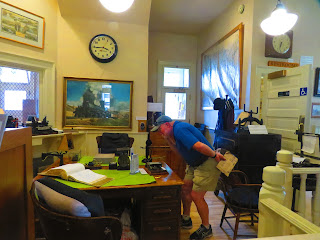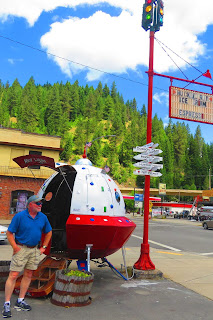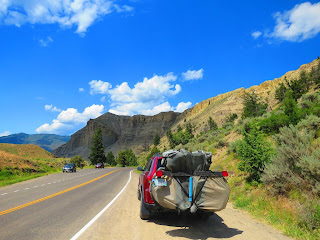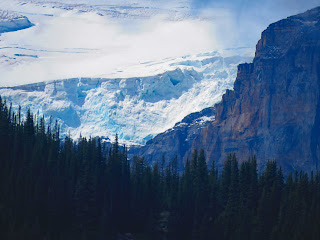Osburn,
Idaho – July 7 thru July 10
We spent four
nights at Blue Anchor RV Park in Osburn, ID just west of Coeur d’Alene.
Historic Wallace
Wallace, located
in the Bitterroot Mountains, was established in 1884 and the entire city is
listed on the National Register of Historical Places. Wallace hit it big in
1882 when gold and silver were found in this tiny mountain town. Silver Valley
became the world’s largest silver mining region and, today, balances its mining
operations with world-class recreation and tourism.
We strolled the
historic downtown photographing the period architecture.
We toured through the
Northern Pacific Depot Railroad Museum. The beautifully restored 1901 chateau
style railroad depot and grounds tell the town’s rich heritage. The last train
to service the area was July 15, 1992.
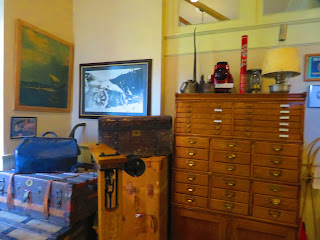
We stopped for
lunch at the Red Light Garage best known for Huckleberry Shakes and classic
burgers. The walls, halls and ceilings are decorated with every kind of road
sign from across the Pacific Northwest, along with campaign memorabilia,
musical instruments and every one of the America’s license plates. We bought some Huckleberry Taffy!

Our next stop was
the Wallace District Mining Museum which was featured on the Travel Channel’s
Mysteries at the Museum. Wallace was once a booming mining camp. The acclaimed
museum tells the story of the richest Silver District on Earth. It is
considered the Silver Capital of the World with over 1.3 billion ounces mined
since 1884. The museum featured a Smithsonian quality life sized mock mine. The
local mine is still active today, supplying the minerals that make 21st
Century communications, transportation, energy and other aspects of modern life
possible.

Over $7 billion in
mineral wealth have fueled an even richer history of fortunes made and lost,
labor strife, assassination of an Idaho Governor and visits from sitting U.S.
Presidents including a visit by Teddy Roosevelt in 1903.


Hollywood and
Wallace go back a long time beginning in the 1920s silent film era and as the
backdrop of major motion pictures in the 1980s and 1990s, including Dante’s
Peak, Heaven’s Gate, and Frivolous Sal. Wallace is also the birthplace and
childhood home of Hollywood movie star Lana Turner. The Turners left Wallace
for San Francisco when Lana was six years old.
The Museum also included
exhibits on the Great Fire of 1910, the largest wildfire in U.S. History. It burned 3 million acres in 36 hours
including a third of Wallace and claimed up to 90 lives. The exhibit also
honors Ranger Ed Pulaski, who saved his crew of 45 men by shepherding them to
safety. Ed is also famous for creating a firefighting tool combining an ax and
an adze. Mike pointed out the “Pulaski Tool” on display, still used by
firefighters today.

We peeked inside
one of Wallace’s longest serving houses of ill-repute, the Oasis Bordello,
which operated until 1988 when the final occupants hastily left town. It was originally built as a Hotel/Saloon.
But in those days, Wallace was a rowdy mining district with little business for
another hotel. With the man to woman ratio at nearly 200:1, the rooms were
transformed into something more lucrative. The Oasis was just one of five
brothels within its block advertising “Rooms”. The museum included historic
artifacts and beautiful murals painted by Robert Thomas in 1993.

Birds of Prey Northwest
Birds of Prey
Northwest is a nonprofit 501(c)(3) organization that was established in 1993. The
organization offers several programs to teach personal responsibility for
conservation, ecology and stewardship and includes an unforgettable learning
experience with eagles, hawks, owls, falcons and ospreys. The website, www.birdsofpreynorthwest.org, serves to educate the public about raptor
conservation and posted research data provides real-time learning
opportunities.
We visited the Bird Wildlife permitted raptor facility. Raptor biologist
Janie Veltkamp rescues, rehabilitates and releases many wild raptors as
director of the nonprofit organization. We met Janie and she toured us around
the grounds as she told us the story of each bird, how they were injured,
rehabilitated and unable to return to the wild.
Many of the eagles we saw had injuries too severe to ever allow them to be released. Possessing
eagle feathers is illegal except for ceremonial use by Native Americans. Janie
struck a deal with local Indians to provide them with the eagle’s shed feathers
for their ceremonies. In turn the Indians subsidized the costs for the eagles’ care.
This also reduced the incentive for poaching of the eagles for their feathers.
We also got a
behind-the-scenes look at some birds that were being rehabilitated, including a
Great Horned Owl and a Peregrine Falcon.
Mike was thrilled to volunteer and
hold an Osprey while it was being weighed.

We also met
Beauty, an adult bald eagle that Janie first met in 2007 while on vacation in
Alaska. Beauty was at an Anchorage wildlife center where she had been treated
after being shot in the face by a poacher’s bullet and left for dead. Her
entire upper beak had been demolished. Beauty could not eat without human help,
let alone return to the wild. Janie knew Beauty’s future looked grim, even
hopeless. Janie’s nursing background recalled the use of prosthetic attachments
for humans – why not for an American bald eagle?
Despite the odds, Janie
felt compelled to help Beauty and took on her case. Janie collaborated with the
U.S. Fish and Wildlife Service for a permit to bring Beauty to Idaho. She flew
home to northern Idaho with an unexpected companion in tow. In the audience
during one of her public education presentations with live trained eagles, was
a Boise mechanical engineer who agreed to help tackle Beauty’s challenge.
Together with a veterinarian and two dentists, and other team members, they would
design, create, and attach the first 3D printed prosthetic eagle beak. The story
was featured in the May 2016 IDAHO magazine as “Engineering Beauty, a Bionic
Beak”.

Beauty and Janie
were also filmed at Birds of Prey Northwest for an episode of the television
program “Unlikely Animal Friends” on cable/satellite channel Nat Geo WILD on
April 30, 2016; and in the June/July issue of the children’s magazine “Ranger
Rick”. The science of her prosthetic beak, along with special hands-on
activities, is featured in the Engineering is Elementary STEM curriculum from
the Museum of Science in Boston. According to
Janie, Beauty continues to serve as an ambassador for our national symbol and
for all raptor species that collide with our modern world. She is an example of
both human cruelty and human compassion.
The organization
depends entirely upon volunteers, donations and grants – it receives no
government funding. Our tour was such an
awesome learning experience that we were compelled to make a donation! We also purchased
two of the children’s books – Beauty and the Beak -- about Beauty’s journey to
a bionic beak written by Janie and award-winning children’s author Deborah Lee
Rose.
Before we left,
Janie suggested we take Scenic Highway 97 that winds around Lake Coeur d’Alene.
We stopped to see some Grebes that use platforms on the water to lay their
eggs. We also stopped for an ice cream! What a great day!
Bozeman,
Montana – July 11 thru July 14
We stayed at the
Bear Canyon Campground in Bozeman, MT for four nights.
Mike with Fly Fishing Guide on Yellowstone
River
For Mike’s 2017
Christmas present, Sharon suggested Mike go fly fishing on the Yellowstone
River with the same guide he had in 2015 when we first visited Yellowstone
National Park. His guide, Maxx, a few years older and wiser, took Mike on a
full-day fly fishing trip.
Mike used his fly-fishing
rod that he purchased in 2015 from the outfitter, Angler’s West Fly Fishing in Emigrant,
MT just north of the entrance to Yellowstone National Park. Mike was feeling
lucky and caught brown trout and cut-throat trout throughout the day. It was
another memorable experience!
Sharon explores Yellowstone National Park
After dropping
Mike off, Sharon headed for the Park on the hunt for animals to
photograph! She did not see the Big Horn
Sheep that usually hang out on the rocks after entering the North Entrance to
the park from Gardiner, MT. But she soon saw a female Elk feeding alongside the
road and a male Pronghorn chasing a female! He sure was frisky that morning!

After looking at
the map, Sharon headed to Lamar Valley, Tower Fall and Dunraven Pass where she
spent the day. The scenery and flowers were beautiful.


Sharon found a
great spot for lunch along the river beneath the shade of a tree. She walked down to where some visitors
had gathered assuming they spotted something along the Yellowstone River. In
fact, there was a huge Osprey nest with a juvenile Osprey being fed by an adult
Osprey. The adult was perched on a branch eating a fish! It was amazing to
watch and photograph!

She saw lots of
bison, marmots, prong horn antelope, and an eagle.

On her way back to
pick up Mike, she again stopped to where the Big Horn Sheep hang out and there
was a mama and baby! It made her day!

Dinner in Livingston with Florida Friends
We learned that
our friends, Gregg and Laurie, from Florida have been RVing in the area so we
met for dinner at Montana’s Rib and Chop House in Livingston. It was great to
share RV stories. We met with them several years ago when we visited Sarasota,
so they could pick our brains about RVing, and there they were!!
Cascade,
Montana – July 15 thru July 19
We spent five
nights at Prewett Creek RV Park in Cascade, MT just north of Helena. The
campground was surrounded by canyons and the beautiful Adel Mountains, and is
along the Missouri River. What made it special was the herd of Big Horn Sheep
that lived in the rocks overlooking our campground.
Mike attends 3-day Knife Forging Class
For Mike’s 2017 birthday
Sharon arranged for Mike to take a 3-day Knife Forging Class with Scott Kirko
at the Howling Wind Forge in Helena, MT. We always watch Forged in Fire on the
History channel and are both amazed at the knife forging process. Mike was
really excited to take the class. When we arrived, Scott showed us the knives
he made, his signature blade, and that he would be heading to a show to sell
his knives after Mike’s 3-day class.
Mike knew just
what he wanted to design: A 4-inch skinner knife with a Damascus blade (115
layers of 1080 and 15N20 steel) with a raindrop pattern, maple burl handle and
brass guard. Scott’s shop was well equipped with a press, power hammer, saws
and grinders.
The blank is forged, pounded out, cut and stacked into 115 layers and forged again until all of the layers are combined into one billet.
The raindrop pattern is transferred to the billet by pressing a die into the hot steel.
The billet is then cut into the shape of the knife. Then the finishing work takes place.
Scott liked Mike’s knife so much, he asked for a photo so he could
show it to everyone at his show!
Scott was a great
instructor and there was never a dull moment! Scott was an interesting
character and Mike had to reign him in if he got off track. He was a serious
hunter and he specialized in hunting knives. He showed us his house with a full-size
Black Bear, a Mountain Lion, a Cape Mount Elk and numerous deer. And when we
left he give us Elk sausage and Elk Jerky that he made!

The Archie Bray Foundation for the Ceramic
Arts
While Mike was in
class, Sharon did a self-guided walking tour of The Archie Bray Foundation for
the Ceramic Arts. Since its beginnings the foundation has provided an
atmosphere of creative excellence for ceramic artists from around the world.
The brick factory was founded over a hundred years ago. It involved several
family names, but ultimately became the Western Clay Manufacturing Company in
1905. It produced various types of brick and tile, many examples of which you
can find in historic Helena architecture. The site is listed on the National
Register of Historic Places.

Below are photos
of the Potter’s Shrine. It is a site-specific sculpture built from 1985-1987 by past resident artist
Robert Harrison to reflect the construction techniques used in the original
pottery buildings and to pay homage to past and present ceramic artists at the
Bray. The shrine is also dedicated to Archie Bray, whose vision gave birth to
the Foundation. His bust, sculpted by Rudy Autio in 1952, along with pieces of
work by former residents that surround the shrine, give evidence to the Bray’s
strong tradition. The shrine is also a visual document of the variety of brick
and tile produced at the Western Clay Manufacturing Company.
Sharon’s favorite
sculptures were the “High Tea at the Bray” by Susannah Israel, 2002.
Sharon toured the
grounds, the exhibition in the Warehouse Gallery with items up for sale in an
upcoming auction, and the studio where ten summer resident artists from around
the world create ceramic art.
Reeder’s Alley
On another day
when Mike was in Class, Sharon walked up Reeder’s Alley and ate lunch at Karmadillos,
a Mexican Restaurant. We visited Helena once before but couldn’t find Reeder’s
Alley at that time.


Built by Louis
Reeder in the late 1800s thru 1882, Reeder’s Alley stands as a memorial to the
architecture of 1870s Helena. Its importance lies not in its splendor, but in
its quaintness. It is one of Montana’s oldest streets and one of the newest and
most interesting restoration projects. Reeder’s Alley has survived the abuse of
man and nature. Saved from urban renewal, the soft, weathered brick shows its
age. The re-grouted cracks and patchwork
brick of these buildings are a testimonial to the many earthquakes “The Alley”
has withstood over the years -- the greatest of which was the devastating quake
of 1935.
Banff,
Alberta, Canada – July 21 thru July 24
We were reluctant
to take the RV over the border, but Banff was on Sharon’s bucket list! We
followed the border crossing rules. And when we arrived at the Border just
north of Glacier National Park (East Entrance), we were told to pull over. It
went downhill from there as we were asked to put out the slides and wait
outside while two agents went through our RV. They were looking for guns and
ammo which we did not have! They even threatened to bring in a search dog and
if anything was found the RV would be confiscated and we would go to jail!! But
we passed with flying colors and we were on our way! We came to stop while a herd of cattle were being rounded up!

We stayed in Banff
National Park at Tunnel Mountain Trailer Court (Full Hook-Ups and Big Rig
Friendly) from July 21 through July 24. It was a perfect location for exploring
the area.
Banff National
Park is in the Rocky Mountains of southwest Alberta. We were in awe of the Canadian Rockies. Icefields
Parkway (Highway 93 North) is considered one of the most scenic drives in the
world. It parallels the Continental Divide through some of the most wild and
remote portions of Banff and Jasper National Park. The glaciated peaks,
turquoise lakes and waterfalls were spectacular!
We took a giant
Ice Explorer ride to the Columbia Icefields at Athabasca Glacier. The
80-minute adventure was incredible.
The blue ice
crunched as we walked along the icefield. The glacial streams carved crevices
everywhere. It was an amazing experience!

We noticed a more
adventurous group on a private tour using crampons and hiking poles.
We also
experienced the Glacier Skywalk with breathtaking glacial vistas and alpine
views. The cliff-edge walkway leads to a platform where we walked on a glass
panel with a 918-foot drop below our feet!

Victoria Glacier
and Lake Louise are the most photographed locations in the Canadian Rockies. It
was a short hike to the lake where we sat on a bench and enjoyed the
spectacular alpine setting.
We tried to visit Moraine
Lake, but due to its popularity and limited parking we could not get in. On our
last day we got up at 5:00 a.m. and arrived only to be told there was no
parking. We circled around and told them it was our last day, so they told us
to wait across the street until they motioned to us. After a half hour or so,
we got in! It was a scenic drive to the parking area. It was a very cold morning.
But we warmed up quickly
as we hiked up a rocky hill to view the lake. We both thought that Moraine Lake
was more beautiful than Lake Louise. We
walked along the rocks to several view points and finally perched on a rock to
watch as the shadow of the morning sun moved across the Lake.


In the Village of Banff,
we found a Rock Shop. Mike got Sharon an Ammolite, the official gemstone of
Alberta. Ammolite is a rare and unusual substance that is a fossilized form of
the mineral aragonite. Ammolite comes from the ammonite fossil. Ammonite
fossils are ancient shells that inhabited a shallow sea that covered southern
Alberta. It is a multi-colored organic gemstone that comes in green, red,
yellow, orange and more rarely in blue and purple.
During our stay Sharon
saw a herd of Elk sitting in a meadow; an Eagle perched atop a tall pine tree; and
a deer eating on the side of the road.
These surprise encounters were
on the side of the road, and since there was no place to park, Sharon could not
get photos! But when we left the RV Park we finally saw a black bear eating berries!
Our adventure
continues as we travel east to explore the Finger Lakes in New York and Lake
Placid, New York; Ontario, Canada; then Abbot and Bar Harbor, Maine. We then make
our way south with stops in Williamsburg, VA; Newland, NC; Hardeeville, SC; and
Silver Springs, FL. We’ll arrive at Sarasota Sunny South RV Resort on November 5.
Until our next blog post, enjoy
the cooler weather and Fall colors! Drop us an e-mail.
We always enjoy hearing from
you!
Mike & Sharon
“The best
thing about the future is that it comes only one day at a time.“
Abraham
Lincoln











































